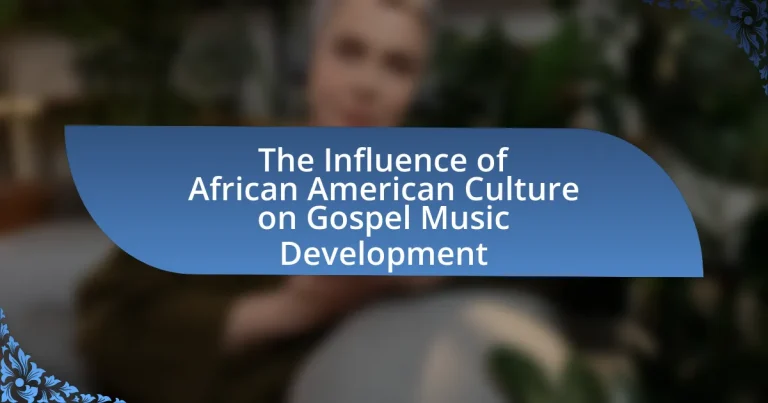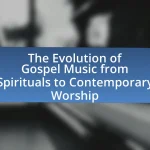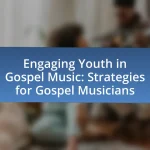The article examines the profound influence of African American culture on the development of gospel music, highlighting its roots in African spiritual traditions and the experiences of enslaved Africans in America. Key elements such as the call-and-response format, emotional expression, and communal participation are discussed, illustrating how these characteristics shaped gospel music’s origins and evolution. Historical events, including the Great Awakening and the Civil Rights Movement, are explored for their contributions to the genre, while the article also addresses the role of African American churches and gospel choirs in fostering cultural identity and community solidarity. Additionally, it outlines the ongoing impact of African American culture on contemporary gospel music, emphasizing themes of hope, resilience, and social justice.
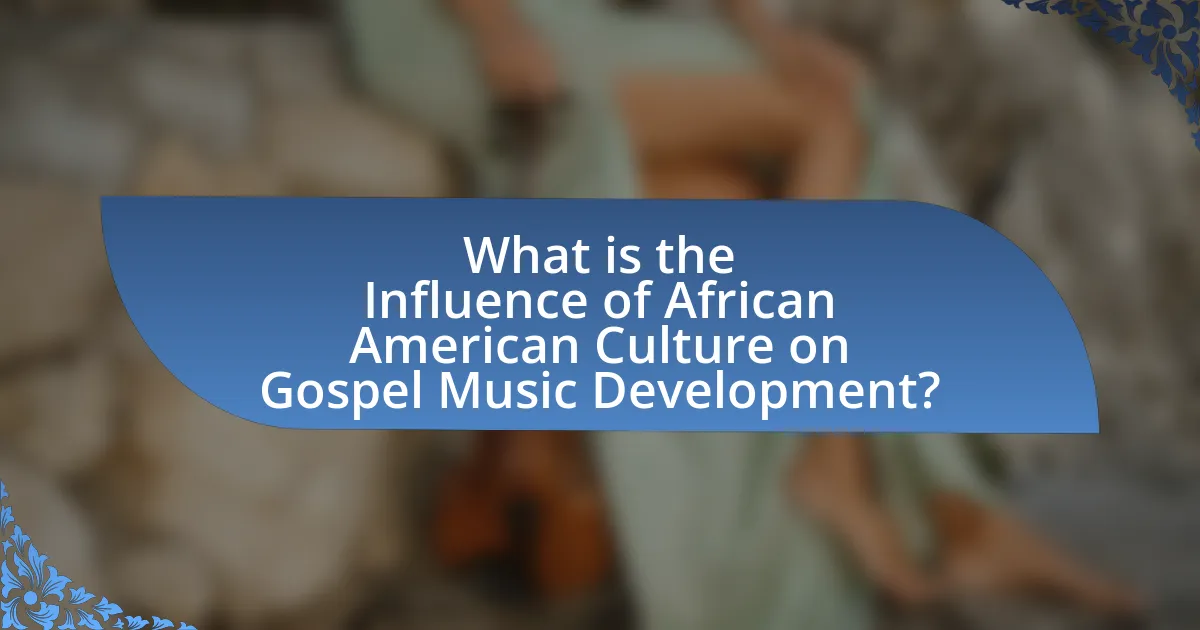
What is the Influence of African American Culture on Gospel Music Development?
African American culture significantly influenced the development of gospel music by integrating spiritual themes, emotional expression, and communal participation. The roots of gospel music can be traced back to African spiritual traditions and the experiences of enslaved Africans in America, who used music as a means of spiritual expression and social cohesion. Historical evidence shows that the call-and-response format, a hallmark of African musical traditions, became a fundamental characteristic of gospel music, allowing for interactive worship and community engagement. Additionally, the incorporation of blues and jazz elements into gospel music reflects the broader African American musical landscape, showcasing the cultural resilience and creativity of African Americans. This blend of spiritual and secular influences has shaped gospel music into a powerful genre that continues to resonate within and beyond African American communities.
How did African American culture shape the origins of gospel music?
African American culture significantly shaped the origins of gospel music through its rich traditions of spirituals, oral storytelling, and communal worship practices. The spirituals, which emerged during slavery, served as a foundation for gospel music, expressing deep religious faith and the struggles of African Americans. These songs often incorporated call-and-response patterns, a hallmark of African musical traditions, fostering community engagement and participation in worship. Additionally, the emotional intensity and improvisational elements found in African American church services influenced the development of gospel music, allowing for personal expression and connection to the divine. Historical evidence shows that figures like Thomas A. Dorsey, known as the “father of gospel music,” drew upon these cultural elements to create a new genre that resonated with the African American experience, further solidifying the link between culture and gospel music’s origins.
What historical events contributed to the emergence of gospel music?
The emergence of gospel music was significantly influenced by the transatlantic slave trade and the subsequent experiences of African Americans in the United States. The forced migration of Africans brought diverse musical traditions that blended with Christian hymns, leading to the development of spirituals in the 19th century. The Great Awakening, a series of religious revivals in the 18th and 19th centuries, further encouraged emotional expression in worship, which shaped the gospel genre. Additionally, the Civil Rights Movement in the 1950s and 1960s utilized gospel music as a tool for social change, reinforcing its cultural significance. These historical events collectively contributed to the rich tapestry of gospel music, reflecting the struggles and resilience of the African American community.
How did African American spirituals influence gospel music’s development?
African American spirituals significantly influenced the development of gospel music by providing foundational themes, musical structures, and emotional expressions. Spirituals, rooted in the experiences of enslaved Africans, emphasized hope, faith, and resilience, which became central to gospel music’s lyrical content. The call-and-response format prevalent in spirituals was adopted in gospel music, enhancing communal participation and emotional engagement during worship. Additionally, the use of syncopated rhythms and improvisation in spirituals laid the groundwork for the dynamic and expressive style characteristic of gospel music. Historical evidence shows that artists like Thomas A. Dorsey, often referred to as the father of gospel music, drew directly from spirituals to create songs that resonated with both religious and cultural identity, further solidifying the connection between the two genres.
What are the key characteristics of gospel music influenced by African American culture?
Gospel music influenced by African American culture is characterized by its emotive expression, call-and-response patterns, and incorporation of spiritual themes. Emotive expression is evident in the passionate vocal delivery, often reflecting personal and communal struggles, which resonates deeply with the African American experience. Call-and-response patterns, a hallmark of African musical traditions, engage the congregation and create a participatory atmosphere during worship. Additionally, spiritual themes often focus on hope, redemption, and faith, drawing from the historical context of African American spirituality, particularly during the era of slavery and the Civil Rights Movement. These characteristics collectively highlight the cultural significance and emotional depth of gospel music within the African American community.
How does rhythm play a role in gospel music?
Rhythm is fundamental in gospel music as it drives the emotional expression and communal participation inherent in the genre. The syncopated rhythms and strong backbeats characteristic of gospel music create an uplifting atmosphere that encourages congregational singing and clapping, fostering a sense of unity among worshippers. Historically, the influence of African musical traditions, which emphasize rhythm, has shaped gospel music’s development, as seen in the use of call-and-response patterns and polyrhythms. These elements not only enhance the musical experience but also reflect the cultural heritage of African American communities, making rhythm a vital component in conveying spiritual messages and fostering a collective worship experience.
What vocal techniques are prominent in gospel music?
Prominent vocal techniques in gospel music include melisma, call and response, and vocal runs. Melisma involves singing multiple notes on a single syllable, which adds emotional depth and expressiveness to the performance. Call and response is a technique where a leader sings a phrase and the congregation or choir responds, fostering community engagement and participation. Vocal runs consist of rapid sequences of notes that showcase vocal agility and skill, often used to convey passion and intensity. These techniques are rooted in African American musical traditions and have been essential in shaping the unique sound and emotional resonance of gospel music.
Why is the church significant in the development of gospel music?
The church is significant in the development of gospel music because it serves as the primary venue for its creation, performance, and dissemination within African American communities. Historically, the church provided a space for spiritual expression and communal gathering, where enslaved Africans and their descendants could blend African musical traditions with Christian themes. This fusion led to the emergence of gospel music as a distinct genre characterized by its emotive vocal style and rhythmic complexity. The church’s role is further evidenced by the fact that many early gospel songs were composed by church leaders and performed during worship services, solidifying the genre’s connection to religious practice and community identity.
How did African American churches contribute to the evolution of gospel music?
African American churches significantly contributed to the evolution of gospel music by serving as the primary venues for its development and dissemination. These churches provided a space where spirituals, hymns, and folk music merged, leading to the creation of a distinct musical genre characterized by emotional expression and communal participation. The Great Migration in the early 20th century further facilitated this evolution, as African Americans brought their musical traditions to urban centers, influencing the broader American music landscape. Additionally, prominent figures such as Thomas A. Dorsey, often referred to as the “father of gospel music,” emerged from church backgrounds, integrating blues and jazz elements into gospel, thus shaping its modern form. This historical context underscores the churches’ pivotal role in nurturing and evolving gospel music as a vital cultural expression within the African American community.
What role do gospel choirs play in the cultural expression of African American communities?
Gospel choirs serve as a vital medium for cultural expression within African American communities by fostering a sense of identity, unity, and spiritual connection. These choirs often reflect the historical experiences, struggles, and resilience of African Americans, particularly through the incorporation of traditional African musical elements and contemporary styles. For instance, the call-and-response format commonly used in gospel music mirrors African oral traditions, reinforcing community bonds and shared cultural heritage. Additionally, gospel choirs play a significant role in social and political movements, as seen during the Civil Rights Movement, where music became a tool for empowerment and activism. This historical context underscores the choir’s function not only as a musical ensemble but also as a cultural institution that preserves and promotes African American heritage.
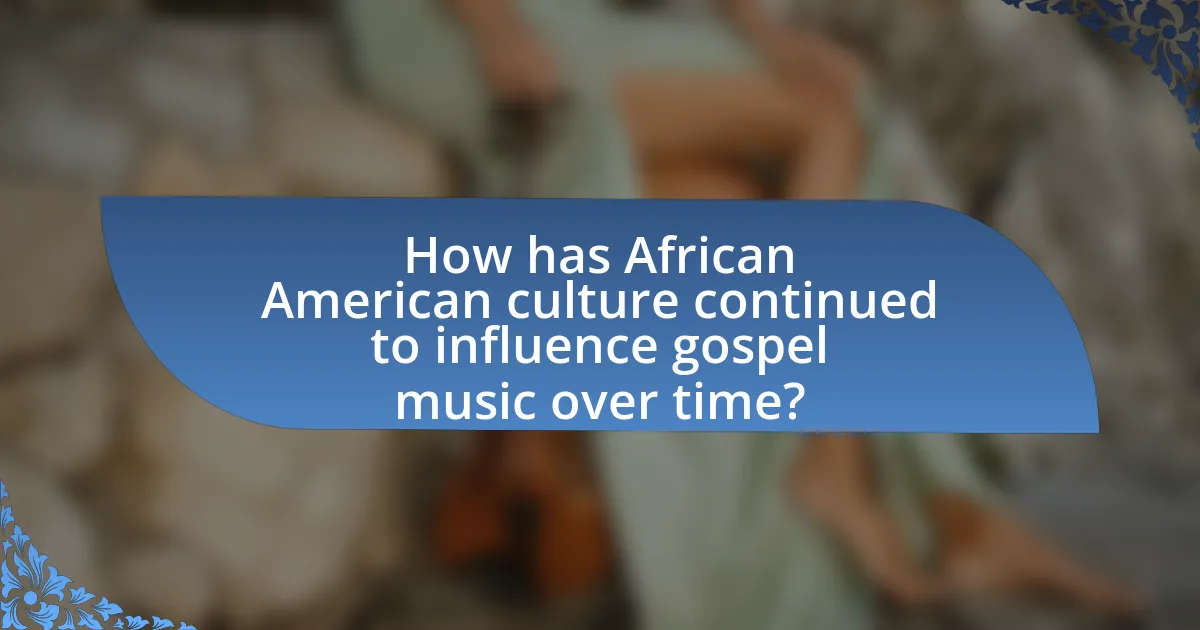
How has African American culture continued to influence gospel music over time?
African American culture has profoundly influenced gospel music over time through its rich traditions, spirituals, and communal practices. The roots of gospel music can be traced back to the spirituals sung by enslaved Africans, which expressed their struggles and hopes, and these elements remain integral to contemporary gospel. The call-and-response format, a hallmark of African American musical traditions, continues to shape gospel performances, fostering a sense of community and participation. Additionally, the incorporation of blues and jazz elements into gospel music reflects the broader African American cultural experience, allowing for emotional expression and innovation. Historical figures such as Thomas A. Dorsey, known as the “father of gospel music,” exemplify this influence by blending secular and sacred music styles, further solidifying the connection between African American culture and gospel music.
What changes have occurred in gospel music throughout the decades?
Gospel music has evolved significantly throughout the decades, reflecting changes in cultural, social, and musical landscapes. In the 1930s and 1940s, gospel music was primarily characterized by traditional hymns and spirituals, often performed in church settings. The 1950s and 1960s saw the rise of gospel quartets and the incorporation of rhythm and blues elements, which broadened its appeal and led to the emergence of artists like Mahalia Jackson and Sam Cooke.
By the 1970s and 1980s, gospel music began to fuse with contemporary styles, leading to the creation of gospel rock and the popularity of artists such as Andraé Crouch. The 1990s introduced a more polished production style and the rise of gospel choirs, with groups like the Winans gaining mainstream recognition. In the 2000s and beyond, gospel music has increasingly embraced hip-hop and pop influences, exemplified by artists like Kirk Franklin and Tasha Cobbs Leonard, reflecting the ongoing integration of African American culture into the genre.
These changes illustrate how gospel music has adapted over time, maintaining its roots while also evolving to resonate with new generations.
How did the Civil Rights Movement impact gospel music?
The Civil Rights Movement significantly impacted gospel music by infusing it with themes of social justice, empowerment, and resistance. During the 1950s and 1960s, gospel music became a powerful tool for expressing the struggles and aspirations of African Americans, reflecting the movement’s call for equality and civil rights. Notable figures such as Mahalia Jackson and the Staple Singers used gospel music to inspire activism and unify communities, with songs like “We Shall Overcome” becoming anthems of the movement. This integration of spirituals and protest music not only elevated the genre’s prominence but also solidified its role as a voice for change within the African American community.
What modern genres have been influenced by traditional gospel music?
Modern genres influenced by traditional gospel music include contemporary Christian music, soul, R&B, hip-hop, and blues. Contemporary Christian music often incorporates gospel’s melodic and harmonic structures, while soul and R&B draw heavily on gospel’s emotional delivery and vocal techniques. Hip-hop frequently samples gospel music, using its themes of faith and resilience, and blues has roots in the spirituals and hymns of the African American church. These connections illustrate the profound impact of traditional gospel music on a wide array of modern musical styles.
How do contemporary artists reflect African American culture in their gospel music?
Contemporary artists reflect African American culture in their gospel music by incorporating themes of resilience, spirituality, and community, which are central to the African American experience. For instance, artists like Kirk Franklin and Tasha Cobbs leverage modern musical styles such as hip-hop and R&B to convey messages of hope and faith, resonating with the cultural narratives of struggle and triumph within the African American community. Additionally, the use of call-and-response techniques in their performances mirrors traditional African American worship practices, reinforcing cultural continuity. This blending of contemporary sounds with historical elements showcases the dynamic evolution of gospel music while honoring its roots in African American culture.
What themes are prevalent in modern gospel music?
Modern gospel music predominantly features themes of hope, faith, love, and redemption. These themes reflect the spiritual and emotional experiences of individuals, often drawing from biblical narratives and personal testimonies. For instance, the theme of hope is frequently expressed through lyrics that encourage perseverance in the face of adversity, while faith is emphasized as a guiding force in life. Love, particularly divine love, is celebrated as a transformative power, and redemption is portrayed as a central aspect of the Christian experience, highlighting the belief in forgiveness and new beginnings. These themes resonate deeply within the African American cultural context, where gospel music serves as both a form of worship and a means of expressing communal struggles and triumphs.
How do collaborations between genres enhance the gospel music landscape?
Collaborations between genres enhance the gospel music landscape by introducing diverse musical elements and broadening the audience reach. These collaborations often blend traditional gospel with genres such as hip-hop, R&B, and rock, creating innovative sounds that resonate with a wider demographic. For instance, artists like Kirk Franklin have successfully merged gospel with hip-hop, resulting in chart-topping hits that attract listeners beyond the church community. This genre fusion not only revitalizes gospel music but also fosters cultural exchange, allowing for the incorporation of contemporary themes and styles that reflect the evolving nature of African American culture. Such collaborations have been shown to increase streaming numbers and concert attendance, demonstrating their impact on the gospel music industry’s growth and relevance.
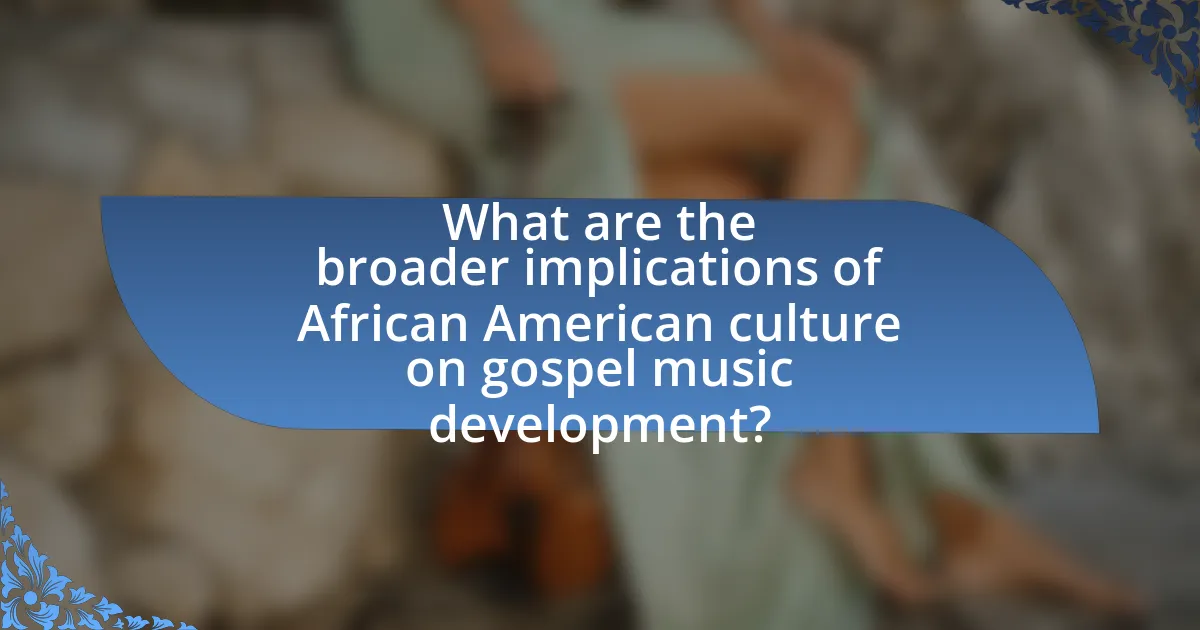
What are the broader implications of African American culture on gospel music development?
African American culture has profoundly shaped the development of gospel music, influencing its themes, styles, and performance practices. The cultural heritage, rooted in African traditions and the experiences of slavery, has infused gospel music with a deep sense of spirituality and communal expression. For instance, the call-and-response technique, prevalent in African musical traditions, became a hallmark of gospel music, fostering participation and emotional engagement among congregants. Additionally, the historical context of African Americans facing oppression and seeking solace in faith has led to the emergence of powerful lyrical content that addresses hope, resilience, and liberation. This cultural backdrop has not only enriched the musical form but also established gospel music as a vital expression of identity and social commentary within the African American community.
How does gospel music serve as a form of cultural identity for African Americans?
Gospel music serves as a vital form of cultural identity for African Americans by expressing their historical experiences, spiritual beliefs, and communal values. This genre originated in the early 20th century, rooted in African American spirituals and hymns, reflecting the struggles and resilience of the African American community, particularly during the era of slavery and the Civil Rights Movement. The lyrics often convey themes of hope, faith, and liberation, resonating deeply with the collective identity of African Americans. For instance, songs like “We Shall Overcome” became anthems during the Civil Rights Movement, symbolizing the fight for equality and justice. Additionally, gospel music fosters a sense of community and belonging, as it is often performed in churches and gatherings, reinforcing social bonds and cultural heritage. The integration of African musical elements, such as call-and-response patterns, further emphasizes the unique cultural identity embedded in gospel music.
In what ways does gospel music address social issues within the African American community?
Gospel music addresses social issues within the African American community by serving as a platform for expressing struggles, resilience, and hope. It often reflects themes of social justice, civil rights, and community solidarity, which resonate deeply with the historical and contemporary experiences of African Americans. For instance, songs like “We Shall Overcome” became anthems during the Civil Rights Movement, highlighting the fight against racial inequality and injustice. Additionally, gospel music frequently incorporates messages of empowerment and healing, addressing issues such as poverty, violence, and systemic oppression, thereby fostering a sense of unity and collective strength within the community.
How does gospel music foster community and solidarity among African Americans?
Gospel music fosters community and solidarity among African Americans by serving as a unifying cultural expression that reflects shared experiences, struggles, and faith. This genre often emerges from communal worship settings, where collective singing and participation create a sense of belonging and mutual support. Historically, gospel music has roots in the African American church, which has been a central institution for social gathering and community building, particularly during the Civil Rights Movement. For instance, songs like “We Shall Overcome” became anthems of unity and resilience, reinforcing social bonds and collective identity among African Americans. Additionally, gospel music often incorporates call-and-response patterns, encouraging active engagement and reinforcing communal ties during performances.
What can be learned from the influence of African American culture on gospel music?
The influence of African American culture on gospel music reveals the deep connection between spirituality and community expression. This cultural impact is evident in the incorporation of African musical elements, such as call-and-response patterns and rhythmic complexity, which enhance the emotional depth of gospel music. Historical context shows that gospel music emerged from the experiences of African Americans, particularly during the slavery era, where it served as a means of spiritual solace and social commentary. The rich tradition of storytelling within African American culture is also reflected in gospel lyrics, which often convey messages of hope, resilience, and faith. This cultural synthesis not only shaped the sound of gospel music but also established it as a vital form of artistic and spiritual expression within the African American community.
How can understanding this influence enhance appreciation for gospel music?
Understanding the influence of African American culture on gospel music enhances appreciation by revealing the historical and social contexts that shaped its development. This cultural background includes the struggles and resilience of African Americans, which are expressed through the emotional depth and spiritual themes found in gospel music. For instance, the use of call-and-response patterns, rooted in African musical traditions, fosters a communal experience that deepens listeners’ connection to the music. Additionally, recognizing the role of gospel music in the Civil Rights Movement highlights its significance as a tool for empowerment and social change, further enriching the listener’s experience and appreciation.
What best practices can be adopted to preserve the cultural significance of gospel music?
To preserve the cultural significance of gospel music, it is essential to implement educational programs that teach its history and roots within African American culture. These programs can include workshops, community events, and school curricula that highlight the origins of gospel music, its evolution, and its role in social movements, such as the Civil Rights Movement. Research indicates that understanding the historical context enhances appreciation and fosters a deeper connection to the music, as seen in initiatives like the Smithsonian National Museum of African American History and Culture, which showcases gospel music’s impact on American culture. Additionally, supporting local gospel choirs and artists through funding and performance opportunities can help maintain the tradition and encourage new generations to engage with this vital cultural expression.
